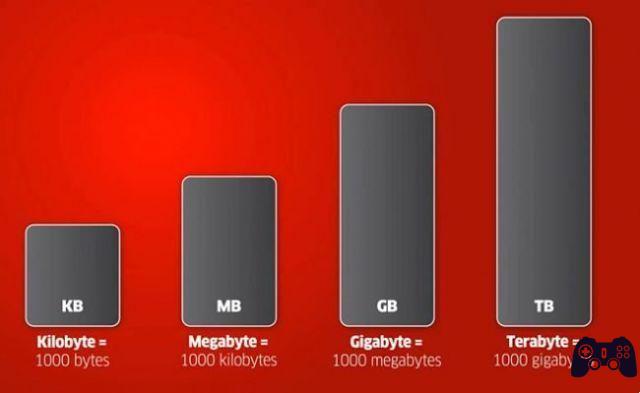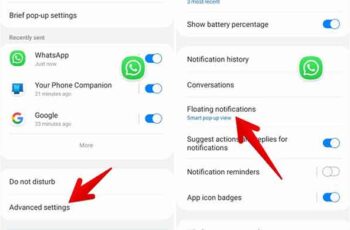
Without a doubt, one of the most common technology questions we are asked regarding these data storage metrics, such as terabytes, gigabytes, petabytes, megabytes, etc. You've probably heard of these terms before, but do you know what they mean?
How many gigabytes are there in a terabyte? What does one terabyte mean in the real world? These are all things you need to know before buying a hard drive or memory card, choosing a tablet based on the memory it has, etc.
Fortunately, as confusing as it may seem at first glance, all of these units of measurement are easily convertible from each other and are simple concepts to understand thanks to the examples we have provided below. Let's start with the basics.
Read also: Megabit vs megabyte: what's the difference?
Terabyte, Gigabyte, and Petabyte: Which is Larger?
Right away, knowing which is bigger and which is smaller, as well as the abbreviations that represent these numbers, is probably the most useful thing to get started.
All of these computer technology storage units are based on the byte, which is the amount of memory required to store a single character of text:
- Un exabyte (EB) is larger than a ...
- petabyte (PB), which is larger than a ...
- terabyte (TB), which is larger than a ...
- gigabyte (GB), which is larger than a ...
- megabyte (MB), which is larger than a ...
- kilobyte (KB), which is larger than a ...
- byte (B)
Less useful in the real world is the bit more small (there are 8 bits in 1 byte) and the largest zettabytes e yottabyte, among others.
Byte is the unit of measure commonly used to describe storage capacity, but there is also the bit that many Internet Service Providers (ISPs) use to describe the speed at which data can be downloaded or uploaded. It is important to understand the differences between bits and bytes so as not to get confused.
To convert from one unit to another, you just need to know that for each level you go up, you multiply by 1.024. Don't worry if you feel confused - there are enough examples below, you will understand how to do the calculation in the blink of an eye. The table at the bottom of this article is also helpful.
You will see many sources online saying that each new level is 1.000 times greater than the smallest, not 1.024. While this is true in some cases, in practical terms, considering how computers use storage devices, 1.024 is the most realistic multiplier to do the calculations with. Now let's move on to the more practical things ...
How much Gigabyte (GB) in a Terabyte (TB)?
There are 1.024 GB in 1 TB.
1 TB = 1.024 GB = 1.048.576 MB = 1.073.741.824 KB = 1.099.511.627.776 B
Let's explain it another way… A TB is 1.024 times bigger than a GB. To convert TB to GB, just take the TB number and multiply by 1.024 to get the number of GB. To convert GB to TB, just take the GB number and divide it by 1.024.
Quanti megabytes (MB) in one gigabytes (GB)?
There are 1.024 MB in 1 GB.
1 GB = 1.024 MB = 1.048.576 KB = 1.073.741.824 B
As in the previous example, a GB is 1.024 times larger than a MB. To convert GB to MB, take the GB number and multiply it by 1.024 to get the number of MB. To convert MB to GB, take the MB number and divide it by 1.024. Megabytes and megabits are different units of measurement.
How big is a terabyte?
Terabyte (TB) is the most common unit used to measure hard drive size and a number that you may actually encounter from time to time.
A single TB is a lot of space. It will take 728.177 floppy disk o 1.498 discs CD-ROM to store only 1 TB of information.
- As of 2018, most of the new affordable computer hard drives are between 1 and 3 TB.
- Many ISPs restrict 1TB monthly data usage.
- The Hubble Space Telescope generates approx 10 TB of new data every year.
- Circa 130.000 digital photos would require 1 TB of space… almost 400 photos every day for a year!
- The famous supercomputer from IBM's Watson game it has 16 TB of RAM.
As you saw earlier in GB to TB math, 1 TB equals little more than a trillion bytes.
How big is a petabyte?
Memorizing a single PB would take more 745 million floppy disks o 1,5 million CD-ROMs, clearly not an effective way to collect a petabyte of information, but it's fun to think about!
- The Avatar movie needed to about 1 PB of memory to view that graphic.
- It is estimated that the human brain can store approximately 2,5 PB of memory data.
- Over 3,4 years of 24/7 Full HD video recording they would have a size of about 1 PB.
- At the end of 2016, the Wayback Machine stood storing 15 PB of data!
- 1 PB equals over 4.000 digital photos per day, For all life.
A single PB is 1.024 TB… this number was already big by itself! In an even more impressive view, 1 PB equals over 1 quadrillion bytes!
How big is an Exabyte?
Even talking about a single EB sounds a little crazy but there are situations where the world really comes across this level of data.
Yes, it's comical, but going back to the previous comparisons: to get to just one EB it would take 763 billion floppy disks o 1,5 billion CD-ROMs. Can you imagine it?
Some amazing examples:
- Way back in 2010, the Internet was already running 21 EB al mese and nearly 6 times that number just seven years later.
- Quasi 11 million films in 4K format would fit comfortably inside a 1 EB storage device.
- A single EB could contain the entire Library of Congress 3000 times.
- A single gram of DNA can contain 490 EB, at least in theory. That's over 5 billion 4K movies.
Now for the math: a single EB is 1.024 PB or 1.048.576 TB. I'm over 1 quintillion byte! Does this number actually exist in reality?
How big is a gigabyte?
Talking about GB is a little more normal - we see GB everywhere, from memory cards to movie downloads, smartphone data plans, and more.
A single GB equals just over 700 floppy disks o little more than a single CD .. little for the numbers we talked about above.
A GB is by no means a small number, but nowadays it is a data layer that we use quickly, sometimes several times a day. It's a number we always run into.
- 1GB can store nearly 300 songs in MP3 format.
- A single Netflix movie in HD could be over 4GB. A 4K version may have a capacity of over 20 GB!
- A disc with a DVD movie contains approximately 9,4 GB.
- Most smartphones store 64GB or 128GB of data (apps, music downloads, etc.).
- Your smartphone data plan, which you use when you are away from the wireless network at home, may be limited to 5GB, 10GB or a little more per month, Iliad 50GB a 8€ al mese.
As we showed in the MB to GB conversion earlier, 1 GB equals over a billion bytes. It's not a small number, but it's no longer an impressive amount as it once was.
The byte table
Here's it all together, which helps illustrate just how big some of those big numbers get!
| Byte comparison table | ||
|---|---|---|
| metric | Value | byte |
| Bytes (B) | 1 | 1 |
| Kilobyte (KB) | 1.024 1 | 1.024 |
| Megabyte (MB) | 1.024 2 | 1.048.576 |
| Gigabyte (GB) | 1.024 3 | 1.073.741,824 thousand |
| Terabyte (TB) | 1.024 4 | 1.099.511.627.776 |
| Petabyte (PB) | 1.024 5 | 1.125.899.906.842.624 |
| Exabyte (EB) | 1.024 6 | 1.152.921.504.606.846.976 |
| zettabytes (ZB) | 1.024 7 | 1.180.591.620.717.411.303.424 |
| Yottabyte (YB) | 1.024 8 | 1.208.925.819.614.629.174.706.176 |
Further Reading:
- What is the difference between bits, bytes, megabytes, megabits and gigabits?
- What is an RCA cable? RCA cables have been around since the 50s
- 32-bit and 64-bit operating systems: what's the difference?
- Alexa flashes, what does this mean?
- A guide to changing the Google Drive folder location in Windows 10






